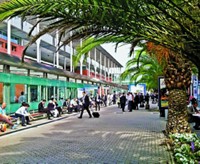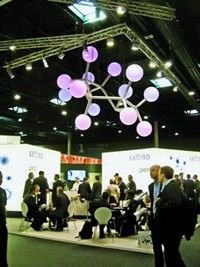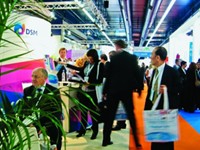Advertisement
Grab your lab coat. Let's get started
Welcome!
Welcome!
Create an account below to get 6 C&EN articles per month, receive newsletters and more - all free.
It seems this is your first time logging in online. Please enter the following information to continue.
As an ACS member you automatically get access to this site. All we need is few more details to create your reading experience.
Not you? Sign in with a different account.
Not you? Sign in with a different account.
ERROR 1
ERROR 1
ERROR 2
ERROR 2
ERROR 2
ERROR 2
ERROR 2
Password and Confirm password must match.
If you have an ACS member number, please enter it here so we can link this account to your membership. (optional)
ERROR 2
ACS values your privacy. By submitting your information, you are gaining access to C&EN and subscribing to our weekly newsletter. We use the information you provide to make your reading experience better, and we will never sell your data to third party members.
Business
Safe Havens
Custom chemical producers at Chemspec showcase pharma and agchem in a down year
by Rick Mullin
July 6, 2009
| A version of this story appeared in
Volume 87, Issue 27

Fine and custom chemicals claimed center stage at the annual Chemspec exhibition in Barcelona, Spain, late last month as exhibitors spotlighted products least impacted by the worldwide recession—those serving drug and agricultural markets.
Executives at the show agreed that sales of pharmaceutical chemicals, including active pharmaceutical ingredients (APIs) made under contract, are holding steady this year. Agricultural chemical markets continue to grow, they said, although not as fast as in recent years. And the news is bad for chemicals serving industrial sectors, especially automotive and construction, which are in a prolonged downturn.
On balance, most of the exhibiting firms claimed that their current portfolios are getting them through a particularly tough year with at least moderate growth in sales.
Chemspec drew approximately 5,000 attendees, about 10% fewer than last year, according to Steve Diprose, vice president of DMG World Media's chemical division, which sponsors the event. There were nearly 400 exhibitors, roughly the same number as in 2008. Emphasizing the importance of pharmaceutical chemicals to the exhibition, Diprose noted that representatives of major European drug companies, including AstraZeneca, Sanofi-Aventis, and GlaxoSmithKline, were among the attendees.
Saltigo, which completed construction of a $14 million API plant in Leverkusen, Germany, last year, is seeing changes in its pharmaceutical business, said Tony Jones, head of sales and marketing for the firm's pharma division. "The demands of the customers are changing," Jones said. "Custom manufacturers are taking more charge of the supply chain, sharing more risk with suppliers. And response times are getting shorter."
Jones said his company is currently investing only in small projects to remove bottlenecks in production. He described the investments as self-funding. As for the new plant, "it is starting to fill up nicely," Jones claimed, adding that its 2.5- to 8-m3 vessels are ideal for projects ranging from Phase II development to drug commercialization.
Uwe Brunk, who leads the recently merged agchem and specialties businesses at Saltigo, said the company is seeing momentum in fungicides. In particular, customers such as Syngenta and BASF are targeting yield increases for farmers in their agricultural products, he says.
Agchem represents more than 50% of Saltigo's sales. Brunk acknowledged that crop markets have dipped in recent months as farmers work off inventory, but he said a rebound is under way. He anticipates a repeat of the double-digit sales growth the sector generated last year. The company recently doubled capacity in Leverkusen and Dormagen, Germany, for five intermediates and two active ingredients for several agricultural customers.
Regarding specialty chemicals, "We have seen customers coming back since mid-May," Brunk said. Business in automotive and electronics manufacturing has inched up recently, but he forecasts that sales this year will be lower than in 2008. "Having any outlook in a specialties business is a positive thing at this time," he maintained.
The pharmaceutical chemical business is holding its own at Sumitomo Chemical, according to Gert De Coster, sales manager for custom synthesis. Agricultural chemicals are doing particularly well, he said, but Sumitomo's total fine and specialty chemical sales will be about the same as last year's, at about $1.2 billion. In 2008, the firm experienced 10% growth in these sectors.
The company is adding some small-scale capacity at its pharmaceutical chemical plants in Japan, De Coster said. In specialties, Sumitomo is making a significant investment in resorcinol production, adding a 10,000-metric-ton-per-year facility in Oita to complement a 20,000-metric-ton facility in Chiba. Resorcinol is used in adhesives, notably for plywood and in tire production.
According to Michel Beauprez, Sumitomo's senior marketing manager for specialties, the Chiba plant has been running at capacity, and resorcinol has been in short supply for nearly two years.
Demand is surprisingly strong, De Coster noted, given the auto industry's troubles. "People are still driving cars, and they need tires," he said.
Minakem and Axyntis, two French fine chemicals firms that were launched in recent years via private equity acquisitions of assets from diversified chemical companies, are reporting significant growth in API production this year.
Minakem has made two major acquisitions. The firm, formerly the fine chemicals operations of France's SEAC and Germany's Chemtec Leuna, purchased Penn Specialties' furfural and furan derivatives business in Memphis last year, creating a division called PennAkem. Last month, Minakem closed on the acquisition of AstraZeneca's API facility in Dunkirk, France, which complements plants in Leuna and at its headquarters in Lille, France. More important, it gives Minakem large-scale capabilities that allow it to manufacture APIs for customers' Phase II and III clinical trials and for commercial production, according to President Frédéric Gauchet.
Minakem has also invested in an expansion in Leuna, which achieved the Food & Drug Administration's current Good Manufacturing Practice certification last year. The plant has reaction vessels with capacities of up to 14,000 L and total capacity of 34 m3. The Dunkirk plant has capacity of more than 150 m3 and features a 22-L dryer, clean rooms, micronization capability, and purified water for injectable-drug production.
"The pharmaceutical industry is resilient," Gauchet said, explaining the need for larger capacity manufacturing. "But being too dedicated to customers' R&D needs is too risky. We need a balance of R&D and commercial-scale production."
Minakem's sales reached $95 million last year, less than 2% above 2007. With the acquired facility, Gauchet expects to reach $140 million in 2009. "Business is getting much better," he said. "But we have only short-term visibility."
Axyntis, formed via the 2007 acquisition of Orgasynth's fine chemicals and dyes group by managers and the private equity firm Argos Soditic, expects growth in APIs and pharmaceutical intermediates, which represent half of its sales, to reach 20% in 2009. This would nearly double last year's growth rate, according to Chief Executive Officer David Simonnet.
Simonnet said the anticipated boost in business will stem in part from a doubling of R&D and from a new management team recruited from major drug and chemical firms. He was formerly head of SNPE's fine chemicals group, Isochem.
The downside for Axyntis, Simonnet acknowledged, is that sales of fine chemicals for electronics applications, representing 20% of the company's business, fell dramatically in the first half of 2009. This will result in an overall sales drop of 5–10% this year.
Axyntis, which had sales of $103 million in 2008, is embarking on a $4.2 million reduction in fixed costs and a 15% cut in working capital. The group operates five plants in France—four for fine chemicals and one for dyes. Simonnet says the firm is on the lookout for an acquisition.
Other small European fine chemicals producers are making investments despite a slowdown in sales. Dottikon Exclusive Synthesis, which has seen its API production increase from 60 metric tons to 200 metric tons during the past 10 years, invested $36 million in new equipment for hydrogenation and cryogenic synthesis, according to Ivo Hubacek, director of technology development.
"Our plants are at full capacity," he said, adding that new vessels with capacities of up to 20 m3 will eliminate bottlenecks in large-scale API production. The firm logged sales of $140 million last year, a 9% increase. "We've seen better growth before," Hubacek admitted.
Although several firms said they are seeking to increase their custom chemical production to offset a slump in off-the-shelf specialty chemical sales, the vagaries of custom manufacturing can also pose a threat in tough economic times, according to Lukas von Hippel, vice president of marketing and sales at Germany's AllessaChemie. Specializing in polymerization, AllessaChemie does about 70% of its business on an exclusive contract basis, much of it in the area of specialty additives.
"We are trying to balance our exclusive synthesis with our catalog business," he said, and achieve a 50-50 split.
In the past year, the company introduced Allessan APT, a coatings additive that enhances color brightness and durability; Allessan CAP, a coupling agent that guards against drug racemization; and Allessan RSM, an antiaging additive with applications in lubricants, paints, and polymers. All three, according to von Hippel, are examples of new products added to the catalog via codevelopment projects with customers. Allessan RSM, for example, stemmed from a chemical for ultra-high-temperature fracturing applications in oil fields.
The markets for lithium chemicals, including lithium-ion batteries, tagged as a solid growth prospect before last year, are in a downturn, noted Werner Kraus, business manager for lithium metal and butyllithium at Chemetall. Sales will be flat this year, he said, with a return to growth expected in 2010. "But it will be below 2008 levels," Kraus acknowledged.
Chemetall rival FMC has seen a decline in sales of organolithium compounds for industrial polymer markets, according to Marketing Director Stephen Lewis. The drop is compensated for to some extent by pharmaceutical and agchem markets and sales to Asia, where demand is growing for synthetic rubber, Lewis said. The firm recently started a new butyllithium plant in Zhangjiagang, China.
Robinson Brothers will likely end the year with no appreciable growth in sales, according to Martin Arnold, life sciences sales manager for the U.K.-based specialties and fine and contract chemicals manufacturer. He said sales for the first three months of 2009 are $1.6 million below budget. Although 30% of the company's business is in pharmaceuticals, other markets, such as rubber and polymers, are in sharp decline. "And there are even signs of a slowdown in agchem," Arnold said, noting that the segment accounts for 25% of sales. He continued, "2009 is a year to take time out, manage the cost base, and not expect great results."
Still, a general sense of optimism pervaded Chemspec, with most attendees claiming they had productive meetings. Mingling at a sunny outdoor reception for exhibitors after the first day, Tony Bastock, CEO of Contract Chemicals, spoke of silver linings: "Our business success story was agchem. Without that, we'd be in much worse shape." The company, which expects another year of sales at about $40 million, is spending about $2 million on production efficiency improvements this year.
Jones of Saltigo noted that for pharmaceutical chemical firms, Chemspec affords an opportunity to spend more time with customers than at larger drug industry events. And people are interested in talking business this year, added Minakem's Gauchet. "You still have people willing to do things."







Join the conversation
Contact the reporter
Submit a Letter to the Editor for publication
Engage with us on Twitter